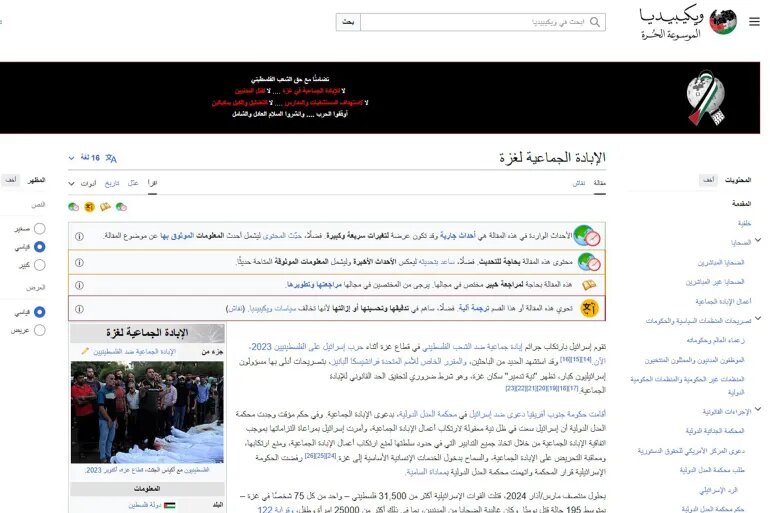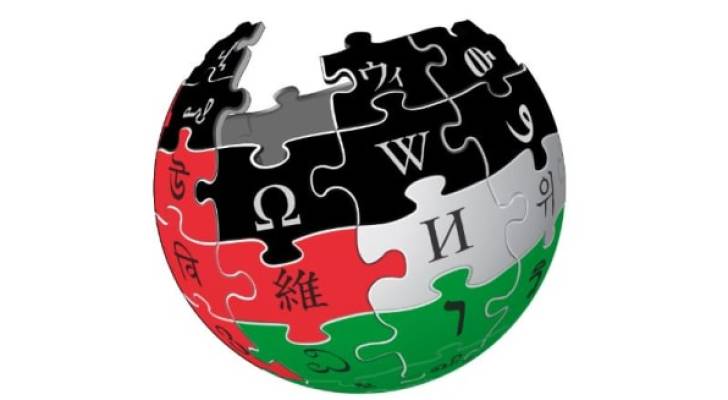Wikipedia logo themed after the Palestinian flag
Wikipedia classifies Israeli Occupation brutality in Gaza as genocide
After months of intense discussions, Wikipedia officially renamed the page initially titled "Allegations of Genocide in the Israeli Occupation's Attack on Gaza in 2023" to "Gaza Genocide" and added the page to its “List of Genocides” page. This decision was made following a vote by Wikipedia's contributors, reflecting a growing consensus among the platform's editors.
The debate surrounding the classification of "Israeli" military operations in Gaza as genocide has garnered significant international attention. It gained further momentum when South Africa filed a lawsuit with the International Court of Justice (ICJ) on Jan. 11, 2024. The lawsuit calls for "Israel’s" actions in Gaza to be classified as genocide and demands immediate measures to halt the ongoing brutality.
Wikipedia editors concluded that there is sufficient evidence and testimony from genocide experts, human rights organizations, and academics to support the use of the term "genocide" concerning the ongoing aggression. This decision follows extensive discussions and the review of numerous reports, including those from Amnesty International and leading scholars on the subject.
Additionally, on the Arabic version of the article, Wikipedia includes its logo wrapped with the Palestinian flag and includes this message, "In solidarity with the rights of the Palestinian people. No to genocide in Gaza... No to killing civilians. No to targeting hospitals and schools... No to deception and double standards. Stop the war... and spread fair and comprehensive peace"

- Page overview -
The newly renamed page, available in 16 languages, now features over 800 sources, ranging from journalistic and human rights reports to statements from UN organizations and experts.
One key piece of evidence cited is a statement by the UN Special Rapporteur on Palestinian territories, Francesca Albanese, who highlighted remarks from Israeli Occupation officials suggesting an intention to destroy Gaza’s population, an essential criterion for defining genocide under the 1948 Genocide Convention.
The page references the 1948 Genocide Convention, which defines genocide as acts committed with the intent to destroy, in whole or in part, a national, ethnic, racial, or religious group. Additionally, it draws on the broader definition of genocide by Polish lawyer Raphael Lemkin, who expanded the concept to include actions aimed at dismantling the political, social, and cultural institutions of targeted groups.
The page also compares the current situation in Gaza with other historical genocides, such as those in Cambodia, Rwanda, and Srebrenica. It emphasizes that genocide involves not only mass killings but also targeted actions like starvation and attacks on civilian infrastructure, including health and education facilities.
- Opposition and debate -
While many editors supported the change, some opposed the classification, arguing that the term "genocide in Gaza" violates Wikipedia’s neutrality policy and demonstrates bias against the Israeli Occupation.
Despite these objections, the majority of contributors maintained that the evidence and the historical context surrounding the "Israeli" actions in Gaza warrant the use of the term "genocide."
- Defining genocide -
In addition to the legal definition under the Genocide Convention, the page references Lemkin's original, broader interpretation of genocide. Lemkin defined it as the destruction of the foundations of national group life, including political, social, cultural, and economic aspects.
Three central themes in the definition of genocide are: the violence must be intentional, organized, and large-scale; the atrocities must target a specific group; and the perpetrator must aim to prevent the group’s survival or reproduction in a given area.
The page provides a comprehensive overview of the political and historical context, the actions considered genocide, the victims, and the academic and legal perspectives on the issue. It discusses how actions like direct killings, starvation, the destruction of civilian infrastructure, and mass arbitrary detention meet the criteria for genocide.
- The ongoing crisis in Gaza -
Since the outbreak of violence on October 7, 2023, the Israeli Occupation has been accused of committing genocide in Gaza, resulting in over 146,000 casualties, including many women and children, and leaving more than 10,000 missing. The humanitarian situation continues to worsen, with widespread destruction and famine causing further suffering, particularly among the elderly and children.
The ongoing aggression has been condemned by the international community, including the UN Security Council, which has called for an immediate cessation of hostilities.
Despite these calls and orders from the ICJ to take action to prevent genocide and improve the dire humanitarian conditions, "Israel’s" military operations persist, exacerbating one of the worst humanitarian crises in modern history.





